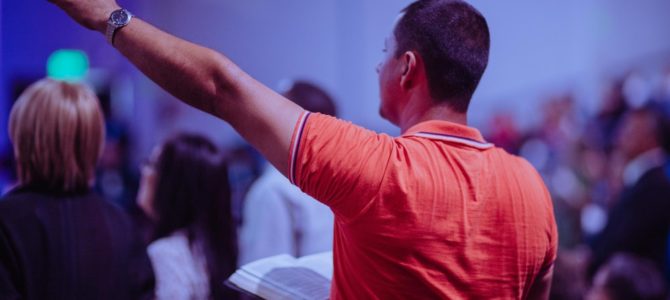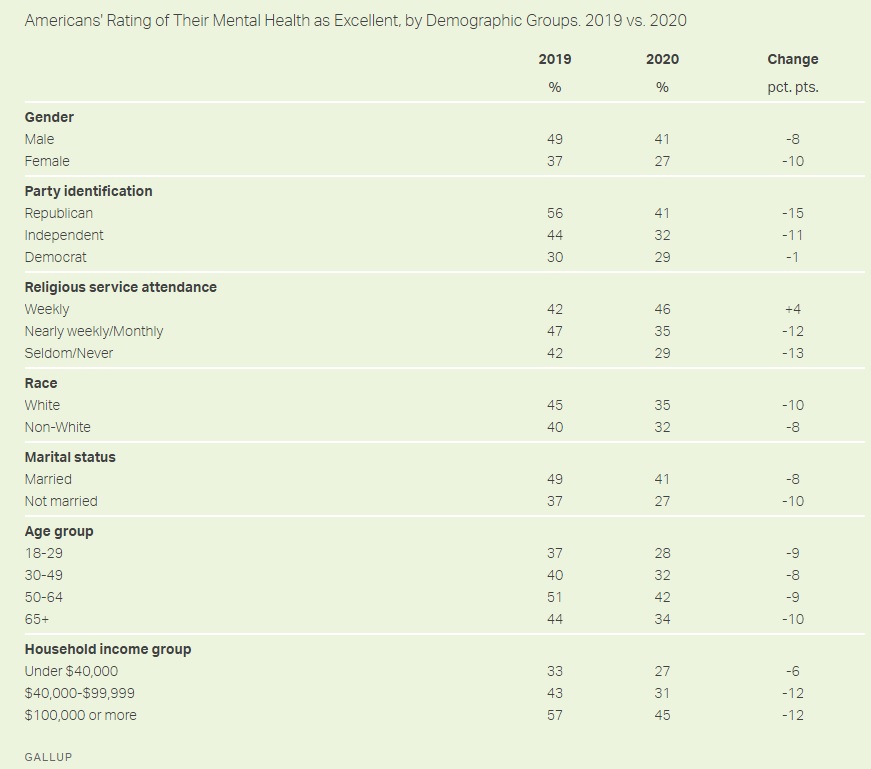
People of faith have been demanding religious freedom since lockdowns began in March. In the pages of the press, in the courts, and in the streets, churches have declared that opening their doors is “essential” — and they were right. According to a new poll, mental health has tanked across the board during this year of mayhem, except for one group: those who regularly attend church.
According to the results of a new Gallup self-assessment survey, Americans’ mental health is at its lowest point in two decades, with the number of those who reported positive emotional or mental well-being down a whole 9 percentage points from just last year. While the degree of changes in mental health varied among different groups, quality declined among every demographic — men, women, Democrats, Republicans, whites, non-whites, rich, poor, married, and unmarried — except for devout religious people.
Remarkably, faithful churchgoers were the only people who reported improvements in mental health since last year. For those who reported weekly attendance at religious services, 46 percent reported their mental health as “excellent,” up four points from 42 percent in 2019.

We Need Church
For people of religious conviction, this is completely unsurprising. In fact, it’s one of the reasons Christians resisted tyrannical COVID-19 orders that discriminated against churches. Church is always necessary for believers, but it has been especially critical throughout the tribulations of a year that included violent riots, a global pandemic, and a contentious election, among other things. While many people’s suffering increased exponentially in 2020, economically, physically, and spiritually, they needed the hope that only the gospel can afford — but often found the church’s doors closed.
“Our society is crumbling. Our values and what this nation was built on — we’re losing all of those,” Greg Fairrington, the lead pastor of Destiny Church in the Sacramento area, told The Federalist in August.
“People are losing their jobs, people are losing loved ones, and they can’t have a memorial service. They can’t have a wedding,” Fairrington said. “The church is so much needed in this moment — we’ve got to open the doors of the church.” The data now bears this out.
For a time, of course, churches were right to comply with government orders that halted their gatherings, as we learned more about the coronavirus, but not anymore. As isolation, mental illness, and suicide rise, the message is clear: We need church.
The national suicide hotline is 1-800-273-8255. More resources are here.
Petty Tyrants Hate Church
As if the data on mental well-being were not enough to show the importance of church gatherings, power-hungry and anti-religious officeholders have tipped their hand when it comes to pandemic safety, demonstrating they are far more worried about keeping Christians out of the pews than they are about actually keeping people safe.
One Democratic governor used state power to surveil church attendees, sanctioning law enforcement to record their license plate numbers to issue quarantine orders. Before signaling his approval of mass Black Lives Matter protests, New York City Mayor Bill de Blasio threatened to permanently close churches that held services. The City of Los Angeles threatened Grace Community Church Pastor John MacArthur with a daily $1,000 fine or the pastor’s arrest if the church wouldn’t stop meeting indoors for worship.
Nevada Gov. Steve Sisolak’s Wuhan virus executive order discriminated against churches while propping up secular gatherings, such as casinos. The latter were permitted to open at half capacity, while the former were restricted to 50 people, regardless of venue size. New York Gov. Andrew Cuomo likewise imposed exorbitant and discriminate limitations on religious gatherings. These are but a few examples among many.
Whom Do We Fear?
Even as the pandemic continues, Americans must decide whether they are willing to sacrifice their spiritual — and, as the survey shows, their mental and emotional — well-being in the hopes of preserving their physical health. Every departure from one’s home, each human interaction, and every essential errand carries with it a certain amount of risk, and church is no exception. We might contract a virus in a church pew, yes, but we might also contract it on a trip to the grocery store. What does it say about our conviction when we’re more afraid of church than we are of Costco? What does it say about our faith when we fear illness more than we fear God?
As the wellness of our souls and minds declines by the day, and our leaders demonstrate consistent animus toward our values, we must recognize that the benefits of church far outweigh the costs. We were right: Church has always been essential.









